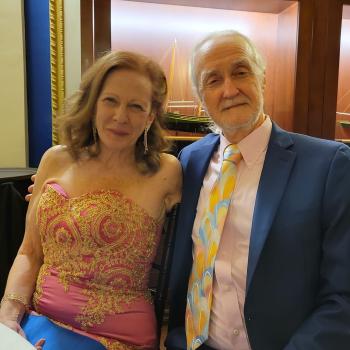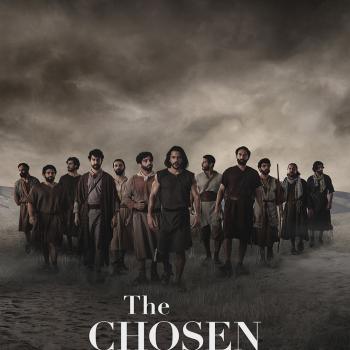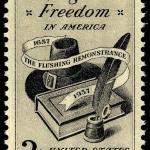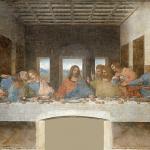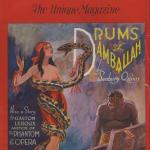It often is a surprise to those who know that I am a college professor to learn that I am also a sports fanatic. In truth, the most rabid sports fans I know are some of my academic colleagues—we talk trash about our favorite teams and athletes with the same energy you might find at any sports bar; indeed, we often have such arguments while drinking adult beverages. My own sports addictions have become selective as I get older, now largely focused on the Red Sox and the Providence College Friars. And the Olympics. I love the Olympics.
The recently begun Paris Summer Olympics have arrived at the perfect time Although I enjoy track and field , the first week of the Summer Olympics is always my favorite, maybe because the focus is on two sports so far out of my wheelhouse that excellence in these sports strikes me as something otherworldly. I can swim just well enough to keep from drowning, so the towering achievements of Olympic swimmers blow me away. The limit of my gymnastic abilities is performing a somersault (I’m pretty sure I can’t even do that anymore, and I’m definitely not going to try), so watching Simone Biles and the rest of the U.S. women’s gymnastics team blow away their competition on the television at the ferry bar as Jeanne and I returned from Long Island last Sunday caused me once again to marvel at what a human being is capable of achieving.
As I look back over my personal timeline, I realize that the Olympics are one of several recurring events that I use to organize my memories and locate myself in the increasingly misty atmosphere of the past. Certain events and athletes became part of my history—here are a few from my early years:
1968—The Grenoble Winter Games are the first that I remember clearly. I had just started learning to ski and France’s Jean-Claude Killy, winner of all three major skiing gold medals, was my hero. I knew, of course, that I was supposed to cheer for American athletes, but my patriotism could not withstand my strong attraction to winners. 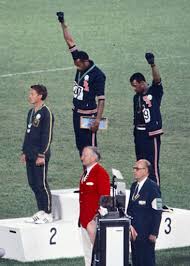 1968, of course, was a year of assassinations, unrest, and turmoil; the Summer Olympics, held in the high altitude and air pollution of Mexico City, were the stage for an iconic protest. During the medals ceremony for the 200-meter race, gold-medalist Tommie Smith and bronze-medalist John Carlos raised black-gloved fists throughout the playing of the National Anthem. Many, including my parents, were outraged, but I recall only thinking of what courage it must have taken for them to make this human rights statement at what was supposed to be an apolitical event. Smith later said, “If I win, I am American, not a black American. But if I did something bad, then they would say I am a Negro. We are black and we are proud of being black. Black America will understand what we did tonight.”
1968, of course, was a year of assassinations, unrest, and turmoil; the Summer Olympics, held in the high altitude and air pollution of Mexico City, were the stage for an iconic protest. During the medals ceremony for the 200-meter race, gold-medalist Tommie Smith and bronze-medalist John Carlos raised black-gloved fists throughout the playing of the National Anthem. Many, including my parents, were outraged, but I recall only thinking of what courage it must have taken for them to make this human rights statement at what was supposed to be an apolitical event. Smith later said, “If I win, I am American, not a black American. But if I did something bad, then they would say I am a Negro. We are black and we are proud of being black. Black America will understand what we did tonight.”
1972: American swimmer Mark Spitz won seven swimming gold medals in the Munich Summer Olympics—an achievement that stood until Michael Phelps won eight golds at the Beijing Olympics in 2008. But Spitz’s remarkable achievement was overshadowed by the Munich Massacre, the first time that terrorism burst into my consciousness. 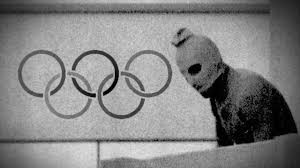 Eleven Israeli athletes were taken hostage by a Palestinian terrorist group; twenty-four hours later all eleven were dead. I’ll never forget my mother bursting into tears when Jim McKay, the multiple-award winning host of ABC’s “Wide World of Sports,” wept as he broke the terrible news.
Eleven Israeli athletes were taken hostage by a Palestinian terrorist group; twenty-four hours later all eleven were dead. I’ll never forget my mother bursting into tears when Jim McKay, the multiple-award winning host of ABC’s “Wide World of Sports,” wept as he broke the terrible news.
When I was a kid my father used to say “Our greatest hopes and our worst fears are seldom realized.” Our worst fears have been realized tonight. They have now said there were 11 hostages; two were killed in their rooms this morn– yesterday morning, nine were killed at the airport tonight. They’re all gone.
1976: I got married (the first time) less than two months before the beginning of the Montreal Summer Olympics, but they are locked in my memory for a couple of reasons. F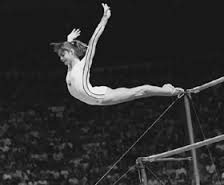 irst, Montreal is only a couple of hours north of where I grew up. Second, they were the Olympics of Nadia Comaneci, the first gymnast ever to receive a perfect score of “10” in the Olympics. She was everyone’s darling—she was cute, spectacularly talented, and in the middle of the Cold War, it was a big plus that she wasn’t Russian (although I doubt many of my friends and family could have located Romania on a map). The rise of the United States as a world force to be reckoned with in gymnastics began over the next decade, largely fueled by young gymnasts who wanted to “be like Nadia.”
irst, Montreal is only a couple of hours north of where I grew up. Second, they were the Olympics of Nadia Comaneci, the first gymnast ever to receive a perfect score of “10” in the Olympics. She was everyone’s darling—she was cute, spectacularly talented, and in the middle of the Cold War, it was a big plus that she wasn’t Russian (although I doubt many of my friends and family could have located Romania on a map). The rise of the United States as a world force to be reckoned with in gymnastics began over the next decade, largely fueled by young gymnasts who wanted to “be like Nadia.”
1980: Every American above a certain age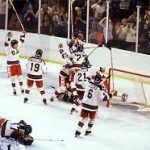 can tell you exactly where she or he was when a bunch of US college kids beat the greatest hockey team in the world in the Miracle on Ice at the Winter Games in Lake Placid. I was standing with my mother and father in the middle of their Florida condominium living room, screaming at the television and reveling in Al Michaels’ famous call: Do you believe in miracles? YES!!! Thirty-five years later memories of that evening came flooding back as I screamed at the television watching the final seconds count down on a wildly improbable victory by the Providence Friars men’s hockey team in the 2015 national college championship game. Miracles do happen—sometimes thirty-five years apart.
can tell you exactly where she or he was when a bunch of US college kids beat the greatest hockey team in the world in the Miracle on Ice at the Winter Games in Lake Placid. I was standing with my mother and father in the middle of their Florida condominium living room, screaming at the television and reveling in Al Michaels’ famous call: Do you believe in miracles? YES!!! Thirty-five years later memories of that evening came flooding back as I screamed at the television watching the final seconds count down on a wildly improbable victory by the Providence Friars men’s hockey team in the 2015 national college championship game. Miracles do happen—sometimes thirty-five years apart.
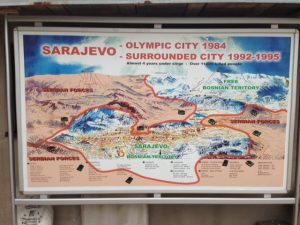
1984: The opening of ABC’s “Wide World of Sports” used to include a montage of clips illustrating “the thrill of victory and the agony of defeat.” The Winter Olympics in Sarajevo featured Torvill and Dean, the ice dancing pair from Great Britain who earned twelve perfect scores from the judges for their program choreographed to one of my favorite pieces of music, Ravel’s “Bolero.” Less than a decade later, in the wake of the collapse of the Soviet Union, Sarajevo was the epicenter of the vicious and bloody Bosnian War; thousands died during the four-year siege of Sarajevo. The thrill of victory and the agony of defeat indeed.
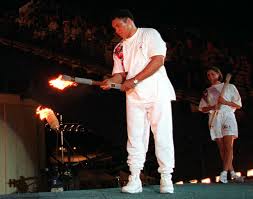
And so many more—The US boycott of the 1980 Moscow Summer Games followed by the Soviet boycott of the 1984 games in Los Angeles, where Mary Lou Retton struck gold for the US in gymnastics; The Battle of the Brians at the 1988 Winter Games in Calgary; Muhammad Ali lighting the torch at the 1996 Atlanta games; Michael Phelps’ dominance of five straight summer games.
Some time ago, an Episcopal priest friend used the following poem from the immortal Dr. Seuss in his sermon:
How did it get so late so soon?
It’s night before it’s afternoon.
December is here before it’s June.
My goodness how the time has flewn
How did it get so late so soon?
The thrust of his sermon was “don’t waste time,” using Seuss’ poem and several of the day’s readings to emphasize the importance of not letting opportunities to be Christ in the world escape our daily notice. The poem comes back to me now as a reminder of how each of our lives are marked by memorable events, the hooks, so to speak, on which we hang the various garments of our lives.
The Olympics have served that purpose for me for six decades—a regular touchstone populated by people forever young in my memory as I grow older. Olympic memories cause me to both recognize the passage of time and the eternal youth of the human spirit. No wonder I’m a sports fanatic.





